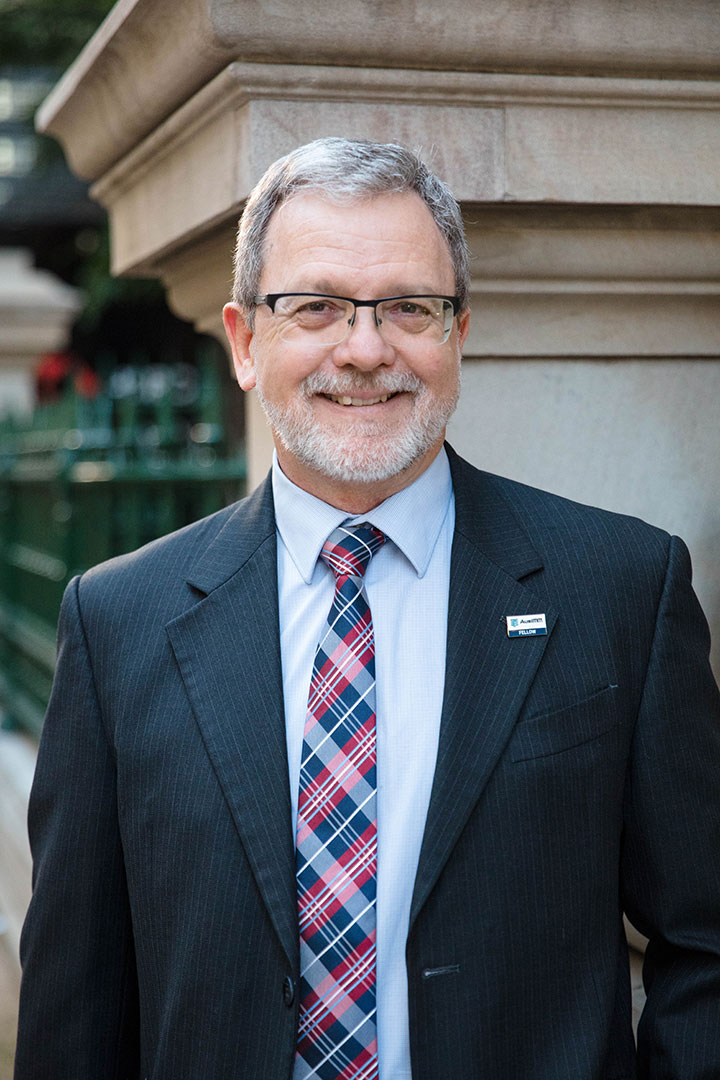 Professor Mark Noppé is the newly appointed director of the WH Bryan Mining Geology Research Centre (BRC). He is a recognised leader in mining and geoscience and has extensive consulting and consultancy management experience, most recently with SRK Consulting. He is also an active member, and current director, of AusIMM.
Professor Mark Noppé is the newly appointed director of the WH Bryan Mining Geology Research Centre (BRC). He is a recognised leader in mining and geoscience and has extensive consulting and consultancy management experience, most recently with SRK Consulting. He is also an active member, and current director, of AusIMM.
We sat down with Mark to discuss his new role and why he decided to make the move from industry to academia.
“I’d been working in consulting for around 25 years, and it had been a great industry environment to work in.
The consulting industry typically addresses the problems that are there today, and I think part of what appealed to me about SMI in general was that it’s more future focused.
It’s about thinking about tomorrow - how we apply our research to clear the runway for the minerals industry to have the future it needs in order to provide the minerals that our economies, industry and people need – in particular for resourcing decarbonisation.
I was also very interested to work with a group who has the potential to make a difference for our industry.
I have been familiar with the Sustainable Minerals Institute (SMI) and its work since I moved to Brisbane 21 years ago. It’s interesting because people sometimes talk about sustainability as if it’s a modern term and concept, but that term was coined long ago.
And there’s such a rich history within the SMI – the Julius Kruttschnitt Mineral Research Centre is over 50 years old, the BRC is 30 years old, and most of the other research centres have been operating for over 20 years.
The subject matter experts who operate under this SMI umbrella and the breadth of capabilities within the Institute puts it in a strong position to find solutions, influence, and make a difference – so it’s great to be a part of.
When I was offered the position, I thought ‘here’s an invitation to join this special group and it’s not going to come around again in my career, do you embrace it or walk away from it?’ For me it was time to embrace it.
When I look at what Rick (Valenta), Alice (Clark) and others have built in the BRC over recent years in terms of research strength and capability - in Mine Waste Transformation through Characterisation led by Anita Parbhakar-Fox, Total Deposit Knowledge under Rick, Paul Gow and now Nick Cook, and Deep Mining Geoscience under Andre Van As – there is a strong focus and clear pathway.
My intent is to facilitate and strengthen, while looking at where we need to develop or what’s missing, and how we add additional capability or collaborate further in order to add to the value chain of SMI broadly.
I’m keen to understand as much as I can about the broader work of and expertise within SMI, because the more you understand the more you can have your ears and eyes open. This includes finding out or confirming what industry needs – we have a number of Adjunct Professors associated with the Centre and we have the Production Centre Advisory Board, so I want to tap into those people and ask them what’s keeping them awake at night.
Everyone in our space knows mineral grades are decreasing, and unlocking the potential of a deposit is getting more complex, so we have to think differently – how do we find it? Investigate it? Interpret it? And then use that knowledge to better extract and process it.
To paraphrase SMI's Professor Franks, wouldn’t it be great if instead of people talking about mining as wasteful the conversation was around the totality of the contribution of minerals to society. But how do we look at this if say 98% of what we mine is waste and 2% is the commodity or mineral of interest? Does it have to be that way? How do we minimise or repurpose waste? How do we rethink extraction? This starts with understanding the characteristics of the deposits, the rocks, the minerals, and their relationships. These questions are evident in the three research groups within BRC right now.
I have a concern, and I’ve heard others raise it too, that in the race for new energy minerals and the effort different countries are putting in to finding new or alternate supplies - that we could risk fast tracking development in a way that may not be best practice and could potentially compromise working in a sustainable responsible way.
But this is an area where SMI has great strength – after all a key focus area as a university institute is knowledge sharing and knowledge development whether through research degrees, micro-credentials or professional development. Within SMI we have and continue to grow our corporate knowledge to support a sustainable minerals industry and we have a key role to play in advising, researching and seeking applied solutions with industry."
Media: SMI Communications, communications@smi.uq.edu.au, +61 (0) 438 121 757.



